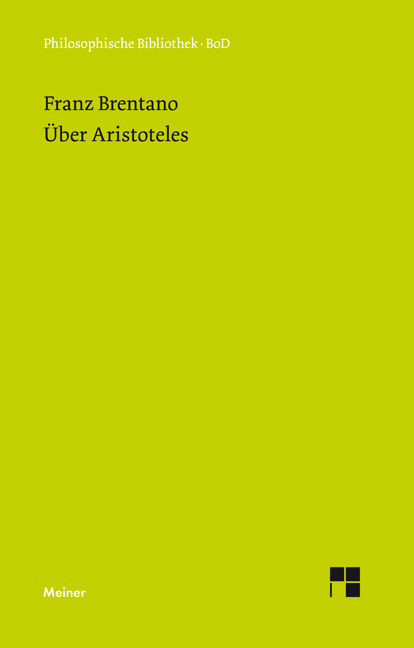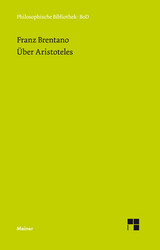Über Aristoteles
Meiner, F (Verlag)
978-3-7873-0631-2 (ISBN)
Franz Brentano wird 1838 in Marienberg am Rhein in einer berühmten katholischen Familie als Neffe von Clemens Brentano und Bettina von Arnim geboren. Von 1856 bis 1862 studiert Brentano Mathematik, Dichtung, Philosophie und Theologie in München, Würzburg, Berlin und Münster. Nach einem Aufenthalt im Dominikanerkonvent in Graz wird er zum Priester geweiht, gerät aber mit seiner ablehnenden Haltung dem Unfehlbarkeitsdogma des Papstes gegenüber schnell in Konflikt mit der Kirche und tritt 1879 aus der Kirche aus.Seine vielbesuchten Vorlesungen wie auch die erfolgreiche schriftstellerische Tätigkeit haben eine weitreichende Wirkung auf die wissenschaftliche Öffentlichkeit seiner Zeit. In Psychologie vom empirischen Standpunkt entwickelt Brentano die Lehre von der philosophischen Psychologie als Bewußtseinsphilosophie, die ihn gleichzeitig zu einem Wegbereiter der Phänomenologie macht. Zu seinen Schülern zählen Edmund Husserl, Alexander Meinong, Sigmund Freud und Rudolf Steiner.Franz Brentano stirbt 1917 in der Schweiz.
»And the ›Nachlaß‹ is, in any event, both interesting and valuable. It is valuable for the wise scholarschip and intelligent philosophy which it brings to many passages, small and great, in the Aristotelian ›corpus‹. It is interesting above all for its general interpretation of Aristotle's philosophy. For Brentano stands out as a pleasingly paradoxical Aristotelian, an Aristotelian who was thoroughly Anglo-Saxon in his method and thoroughly Thomist in his philosophy. Every Aristotelian will find much to love in these pages.«
Jonathan Barnes, Philosophy and Phenomenological Research 49/1988/1
»Professor George's edition of Brentano's Nachgelassene Aufsätze, based on the originals in the Houghton Library at Harvard University, is a careful, scholarly, and thoughtful piece of work. It goes far beyond a mere edition and assumes the status of an independent scholarly contribution because, by annotating Brentano's text with well researched references to Aristotle's works, it gives the reader an introduction to Aristotle's thinking on important controversial topics. One need not be an Aristotelian scholar to appreciate the breadth of knowledge and immense labour required for this task.«
Martha Husain, Ancient Philosophy 7, 1988
| Erscheint lt. Verlag | 1.1.1986 |
|---|---|
| Reihe/Serie | Philosophische Bibliothek ; 378 |
| Sprache | deutsch |
| Maße | 122 x 190 mm |
| Gewicht | 454 g |
| Einbandart | gebunden |
| Themenwelt | Geisteswissenschaften ► Philosophie ► Philosophie Altertum / Antike |
| Geisteswissenschaften ► Philosophie ► Philosophie der Neuzeit | |
| Schlagworte | Aristoteles • Erkenntnislehre • Ethik • Hardcover, Softcover / Philosophie/Antike • HC/Philosophie/Antike • Logik • Metaphysik • Poetik • Politik • Theologie • Theophrast |
| ISBN-10 | 3-7873-0631-5 / 3787306315 |
| ISBN-13 | 978-3-7873-0631-2 / 9783787306312 |
| Zustand | Neuware |
| Haben Sie eine Frage zum Produkt? |
aus dem Bereich




